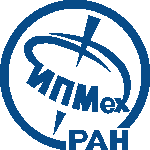
|
ИСТИНА |
Войти в систему Регистрация |
ИПМех РАН |
||
Asymptotic Spectral Series of Shrödinger Operator with Delta Potential Localized at the Poles of Surfaces of Revolutionдоклад на конференции
- Авторы: Рыхлов В.В., Шафаревич А.И.
- Международная Конференция : Integrable systems and quantum theory 2024
- Даты проведения конференции: 23-28 сентября 2024
- Дата доклада: 28 сентября 2024
- Тип доклада: Устный
- Докладчик: не указан
- Место проведения: СПбГУ, Россия
-
Аннотация доклада:
The Schr\"odinger operators with delta potentials, as one described in our study, are commonly used to model physical systems with localized impurities or defects. These operators are vital for understanding how quantum particles behave in the presence of such perturbations, providing insights into the influence of localized perturbations on the system dynamics as a~whole. We consider the spectral problem for the Schr\"odinger operator on either $M^2\subset \mathbb R^3$ or $M^3\subset \mathbb R^4$ of the form $$ H \psi = E \psi,\qquad H = -\frac{h^2}{2}\Delta + \delta_{x_1}(x) + \delta_{x_2} (x),\qquad x\in M, $$ where $-\Delta$~denotes the Laplace--Beltrami operator on~$M$, and $\delta_{x_j}$ represents the Dirac delta function centered at~$x_j$, in the semiclassical limit as $h\to +0$. In this context, the operator~$H$ is conceived as a~self-adjoint extension of the Laplace--Beltrami operator restricted to the functions from $W_2^2(M)$ vanishing at~$x_1$ and $x_2$ (extensions of that kind can be parametrized by a~unitary group). We obtain an~explicit form of the quantization conditions that allow one to establish the asymptotic behavior of the spectrum of~$H$. As for asymptotic eigenfunctions, we derive a~representation for them in terms of the Bessel and Neumann functions of zero order (two-dimensional case) or the Bessel functions of half-integer order (three-dimensional case). This representation offers a~comprehensive understanding of the structural characteristics and behavior of the eigenfunctions as~$h$ approaches zero.
- Добавил в систему: Рыхлов Владислав Владимирович